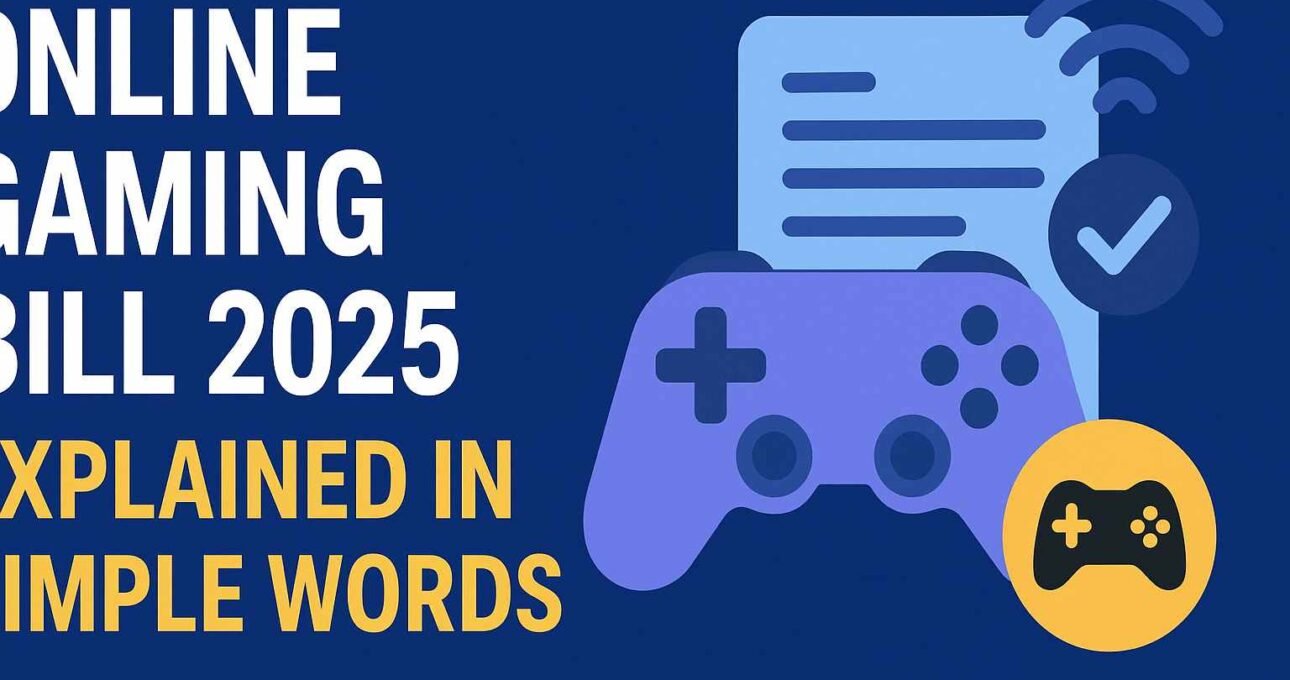The Indian Parliament has passed the Promotion and Regulation of Online Gaming Bill, 2025. This law is going to reshape online gaming in India. It recognises e-sports as a real sport, promotes safe digital gaming, and at the same time bans all kinds of real-money online games.
Here is a simple A to Z guide that explains everything you need to know about the bill.
A – Aim: The main goal is to make gaming safe and regulated. It supports esports and fun casual games but blocks harmful money games.
B – Ban: Any game where people put money to win money is banned. This includes both chance games like rummy and poker, and even skill-based games like fantasy cricket.
C – Cabinet: The Union Cabinet gave its approval before it was introduced in Parliament, showing the government’s seriousness about the issue.
D – Draft: The draft was placed in Lok Sabha on 20 August 2025, with clear categories for esports, social gaming, and money-based gaming.
E – Esports: Recognised as a competitive sport, esports will get government support, tournaments, and training opportunities for players.
F – Fraud and Addiction: The bill addresses concerns of gambling addiction, financial fraud, and money laundering which are linked to online betting apps.
G – Governing Body: A new national authority will be created to regulate gaming, issue licenses, and oversee compliance across India.
H – High Penalties: Running or promoting money-based games can lead to jail up to 3 years and fines up to ₹1 crore.
I – Industry Impact: Popular platforms like Dream11, MPL, and Games24x7 may shut down or change their business, which could lead to job losses and investor exits.
J – Journey in Parliament: The bill was passed in Lok Sabha on 20 August 2025 and Rajya Sabha on 21 August 2025.
K – Key Rules: Companies must take licenses, verify users with KYC, enforce age limits, and set up systems for complaints and disputes.
L – Legal Terms: The law defines games into three types – esports (allowed), casual/social games (allowed), and money-based games (banned).
M – Mechanism: After the law is active, the government will announce detailed rules about licensing, monitoring, and regulation.
N – Next Step: The bill now only requires the President’s assent before it becomes an Act.
O – One India Law: Until now, different states had different laws for gaming. This bill creates one uniform rule for the entire country.
P – Post-Assent: Once the President signs it, the government will notify the date from which the law comes into effect.
Q – Questions Raised: Industry bodies argue that banning skill-based money games is unfair, as courts had earlier recognised them separately from gambling.
R – Reforms and Benefits: The bill encourages esports, supports infrastructure, training, and research, and aims to make India a global hub for competitive gaming.
S – Status: As of 22 August 2025, the bill has been passed by both Houses of Parliament and is waiting for the President’s signature.
T – Touchpoints for Companies: Platforms will have to follow strict compliance – licensing, age checks, anti-money laundering rules, and user safeguards.
U – User Safety: Players will be protected with ID verification, age restrictions, self-exclusion options, spending limits, and grievance redressal.
V – Vision: The long-term vision is to make India’s gaming industry safe, global, and competitive without the risks of gambling.
W – What to Expect: Government will release implementation rules, companies will need to adapt quickly, and non-compliant apps may face shutdown.
X – X-factor Issues: Legal challenges are likely as companies may approach courts on the ban of skill-based games.
Y – Youth Protection: A key aim is to shield children and youngsters from financial risks and addiction due to real-money gaming apps.
Z – Zenith: This is India’s boldest step yet to regulate online gaming and balance growth with social responsibility.
Current Status (August 2025)
The bill has already been passed by both Lok Sabha and Rajya Sabha. It is now waiting for the President’s assent, which will make it an official law.
What Happens Next?
- Presidential approval to turn the bill into an Act.
- Government notification of the date when the law takes effect.
- Detailed rules issued by the central gaming authority.
- Companies will need to follow the law or face strict penalties.
- Industry may challenge parts of the law in courts.

2 Comments
The gaming bill seems progressive, but the ban on skill-based money games is concerning. It might stifle innovation while aiming for safety. A balanced approach could better serve both players and the industry.
Yeah, But let’s see what next they do